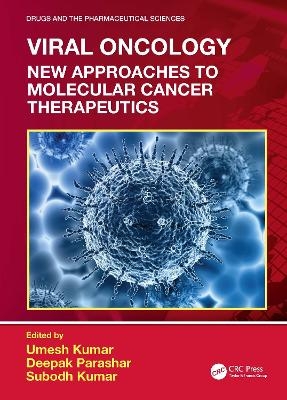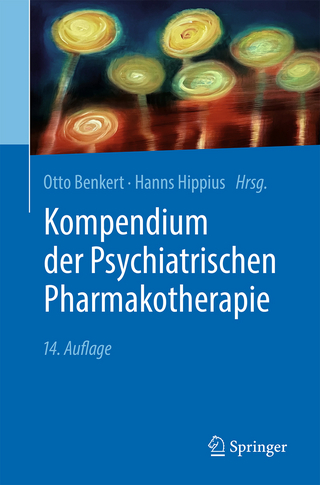
Viral Oncology
CRC Press (Verlag)
978-1-032-85041-2 (ISBN)
- Noch nicht erschienen (ca. Juni 2025)
- Versandkostenfrei innerhalb Deutschlands
- Auch auf Rechnung
- Verfügbarkeit in der Filiale vor Ort prüfen
- Artikel merken
Ideal for oncologists, virologists, and molecular biologists, this text equips readers with both foundational knowledge and the latest advancements in the rapidly evolving field of viral oncology. Stay ahead in the field with this definitive guide to understanding and combating virus-induced malignancies. The volume explores the biology and pathology of oncogenic viruses, offering insights into novel therapeutic approaches, including immunotherapy and gene editing.
Viral Oncology: New Approaches to Molecular Cancer Therapeutics presents an in-depth and authoritative examination of how oncogenic viruses contribute to cancer development and progression, bridging the critical gap between foundational virology and clinical oncology. This volume brings together groundbreaking research from world-renowned scientists and clinicians who explore the complex mechanisms of viral oncogenesis, shedding light on both well-established and emerging viral agents, such as Human Papillomavirus (HPV), Epstein-Barr Virus (EBV), Hepatitis B and C, and Kaposi’s Sarcoma-associated Herpesvirus (KSHV).
The text delves into the molecular processes through which these viruses initiate and sustain cancerous growth, offering insights into viral integration, immune evasion, and cellular transformation. With a focus on the latest developments in therapeutic strategies, Viral Oncology covers innovative approaches, including targeted molecular therapies, immunotherapies, gene editing techniques, and personalized medicine strategies aimed at halting virus-induced tumorigenesis.
Designed for a broad audience of oncologists, virologists, molecular biologists, and clinical researchers, this text provides a thorough understanding of the epidemiology, pathology, and treatment implications of viral oncology. It serves as an indispensable guide to the mechanisms of virus-driven cancers and how these insights are being translated into cutting-edge therapeutic interventions.
With its rich blend of cutting-edge science, clinical applications, and visionary outlook, Viral Oncology: New Approaches to Molecular Cancer Therapeutics is an essential resource for any professional involved in cancer research, diagnostics, and treatment. Whether you are a seasoned oncologist, virologist, or a researcher investigating the molecular basis of cancer, this book offers the latest knowledge and tools to effectively understand and combat virus-induced malignancies.
Stay at the forefront of the rapidly evolving field of viral oncology with this comprehensive and forward-looking text—a definitive resource for understanding the interplay between viruses and cancer, and harnessing that knowledge for therapeutic innovation.
Dr. Umesh Kumar is currently serving as a Professor in the Department of Biosciences at IMS Ghaziabad (University Courses Campus), Ghaziabad, Uttar Pradesh, a position he has held since 2019. In addition, he leads the Research Department at the institution. Prior to this role, he worked as a Scientific Officer in the Department of Biochemistry at the University of Delhi. Dr. Kumar earned his Ph.D. in Biomedical Sciences entitled “Epigenetic regulation in Breast Carcinogenesis” from the Dr. B. R. Ambedkar Centre for Biomedical Research, University of Delhi in 2013. Following his doctoral studies, he joined the Stem Cell Biology Laboratory at the National Institute of Immunology (DBT-Government of India) as a Research Associate in 2014. His research interests encompass a range of topics, including the molecular diagnosis of cervical cancer, the molecular epigenetics of breast carcinogenesis, CAR T-cell therapy, mesenchymal stem cells, epithelial ovarian carcinoma, and tumor virology. Dr. Kumar has published 50 research articles in prestigious journals such as Oncogene, BMC Cancer, Life Sciences, Cellular Signalling, Immunobiology, Heliyon, and Tumor Biology. Dr. Kumar has contributed more than 21 book chapters to international publishers, including Springer Nature, Elsevier, CRC Press, Bentham Sciences and IGI Global. He has been awarded several grants from government funding agencies, including UP Council of Science & Technology, DST-Science and Engineering Research Board and ICMR, New Delhi. In addition to his research publications, Dr. Kumar has received two Young Scientist Awards and one Senior Scientist Award from government-recognized societies and organizations in recognition of his research contributions. He also serves as a reviewer for several international journals, including Phytomedicine, Cellular Signalling, Journal of Cancer Research and Clinical Oncology, Cell Communication and Signaling, Molecular Diversity, Discover Medicine, Medical Oncology, BMC Nutrition, Discover Oncology and the European Journal of Human Genetics. Dr. Kumar has been serving as a Doctoral Research Committee (DRC) Expert member in several universities in India. Dr. Deepak Parashar is an Assistant Professor in the laboratory of Siegfried Janz in the Division of Hematology and Oncology, Department of Medicine, at the Medical College of Wisconsin (MCW), Milwaukee. His long-term research interests involve the development of a comprehensive understanding of key developmental pathways and how alterations in gene expression contribute to human cancer. His academic training and research experience have provided him with an excellent background in multiple biological disciplines including molecular biology, biochemistry, and genetics. As a graduate, He was able to conduct research on the mechanisms of action of a novel class of Cancer Testis Antigen-SPAG9 in Gynecological Cancers. As a doctoral student at National Institute of Immunology, New Delhi His research was focused on the characterization of novel cancer-testis antigens (e.g. SPAG9 and AKAP4 and HSP70-2) in different malignancies. Cancer-testis (CT) antigens have been indicated as a potential target for antigen-specific immunotherapy because they are not found in somatic tissues except testes but are highly expressed by various malignancies and often trigger humoral immune responses in cancer patients. Recently SPAG9 protein has been approved for Phase II Human clinical trials using a dendritic cell-based vaccine for cervical cancer patients at the Cancer Institute, Adyar, Chennai, India and He was part of this study, which has been approved for Phase II Human clinical trial. During his undergraduate and graduate careers, H also received several academic awards including Prof. N. R. Moudgal Young Scientist Award. After joining Medical College of Wisconsin, He continue to build on his previous training experience in cancer research to study critical questions regarding the role of Oncogenic microRNA (onco-miR) in the regulation of angiogenesis and chemoresistance. Overall, as a faculty in the Department of Medicine at the MCW, He has more than 14 years of experience in cancer research and have published several high-impact publications as a first author and also corresponding author. In addition, the proposed training plan outlines a set of career development activities and workshops - as a judge in institutional conferences, public speaking, lab management, and mentoring students- designed to enhance his ability to be an independent investigator. Dr. Subodh Kumar currently working as Senior Demonstrator in the Department of Experimental Medicine & Biotechnology at Post Graduate Institute of Medical Education and Research (PGIMER), Chandigarh. He has more than 8 years of clinical research and teaching experience at PGIMER after completion of his Ph.D. in cancer biology from the department of Biophysics of PGIMER. His research activities involved cancer biology, molecular signaling, experimental toxicology, drug delivery as evident from his impactful published research articles in highly reputed journals like Scientific Reports of Nature group, Journal of medical virology, European journal of medicinal chemistry, and Toxicology In Vitro. He published more than 60 research articles, 12 book chapters and have submitted 2 patents for approval with H-index of 21 and total of more than 2100 citations. To his credit, he has been honored with various International (Late Dr. Santosh Wale Memorial Award, International TATA travel award, YIR travel grant award) and national awards (DST-SERB N-PDF award 2020-22, Best Research Paper publication award at annual research day of PGIMER in 2021& 2022). He has also been active in academics and his achievements as an organizing secretary include National hands-on workshop on “Applications of flow cytometry in Pharmacology” in 2019 & 2020 at PGIMER. As Co-organizing secretary, he is conducting National hands-on workshop on “Pharmacogenomics” every year from 2018 to 2023 in the dept. of Pharmacology of PGIMER.
1. Past, present and future oncogenic viral infections
Taranga Jyoti Baruah, Sthiti Porna, Dutta Partha, Pratim Das, Ningthoujam Seema Devi
2. Global Epidemiology of Oncogenic Viral Infections
Himani Yadav, Umesh Kumar, Prem Lal Uniyal
3. Host-Viral Interactions During Oncogenic Infections
Vandana Anand, Udit Yadav, Umesh Kumar
4. Types of Viral Oncogenic Viral Diseases
Umesh Kumar, Manisha Gupta, Mehak Munjal, Manjari Sharma, Manoj Kumar, Shoorvir Singh
5. Genetic Factors Influencing Oncogenic Viral Disease
Himani Agarwal, Ayush Attery, Deepak Parashar
6. Immune response associated with oncogenic viral diseases
Bhupender Sahu, Bibhudendu Behera, Shalini Rai, Chesta madan, Janvi Sharma, Umesh kumar
7. Immune Evasion Strategies by Oncogenic Viral Infections
Shweta Sinha
8. Co-infections associated with Oncogenic Viral Disease
Aravind Parthasarthy, Shalini N Swamy, Sarojni R Bulbule
9. Oncogenic Viruses-Encoded microRNAs in Hepatotropic oncogenic viral diseases
Vikram Thakur, Priyanka Thakur, Vikramjeet Dutta, Ishani Bora
10. Hepatitis B Viral Infection: Epidemiology, Transmission and Prevention
Yogendra Kumar Verma, Umesh Kumar, Lakshita Tyagi, Prashant Tyagi, Garima Rathi, Manoj Kumar, Harjinder Singh
11. Cytomegalovirus (CMV): Diagnosis and Treatment
Swayam Prabha Rai, Atifa Haseeb Ansari, Umesh Kumar, Durgesh Singh, Sippy Singh
12. Causes, Symptoms and Treatment of Epstein Barr Virus Infection
Chandrashekar naveenkumar, Pandi Anandakumar
13. Challenges of Timely Diagnosis and Treatment of Neonatal Herpes Simplex Virus Infection
Lakshita Tyagi, Prashant Tyagi, Umesh Kumar
14. Detection Methods in HPV- Related Cancers: Pathways and Targeted Therapeutic Strategies
Manish Kushwaha, Jyoti Jaiswal, Akhilesh Kumar Singh, Gaurav Sharma, Umesh Kumar, Anil kumar, Deepak Parashar
15. Chapter title Human T Cell Leukemia Virus (HTLV) induced Carcinogenesis and its Molecular Detection
Koveri Umadevi, Dola Sundeep, D Prathima Raj, Umesh Kumar, Aluuru Gopala Krishna
16. Merkel Cell Polyoma Virus: Oncogenic Potential, Diagnosis and Treatment
Priyanka Thakur, Vikram thakur, Pradeep Kumar, Shilpa Singh
17. Developing New Molecular-Targeted Therapeutics, ‘From Gene to Drug’
Jyoti Kundu, Monika Sihmar
18. The Medical Chemistry of Artificial Nucleic Acids and Therapeutic Oligonucleotides
Aditi Chopra, Sanjeev Kumar, Sweety Basumatary, Girish Chandra Mohanta, satish Kumar pandey
19. Malignant Transformation In-vitro by Oncogenic Viruses
Ajit Pal Singh ,Rahul Saxena ,Suyash Saxena, Neelesh Kumar Maurya ,Umesh Kumar
20. Laboratory Animal Model for Oncogenic Virus
Udit Yadav, Sanket Kumar, Vandana Anand, Umesh Kumar
21. Advances in Immunobiological Agents Against Oncogenic Viral Diseases
Prafula Chandra Tiwari, Manju J Chaudhary, Rishi Pal, Rajendra Nath
22. CAR T-Cell Therapies Against Viral Oncogenesis
Kovuri Umadevi, Dola Sundeep, Sarita Kumari, C Ruchira Clemintina, Umeh Kumar, Aluuru Gopala Krishna, Onteddu Sravya
23. miRNA Associated Therapies for Oncogenic Viral Diseases
Sanjeev Kumar, Sweety Basumatary, Lalchuangsangi, Aditi Chopra, Giish Chandra Mohanta, Satish Kumar Pandey
24. Vaccines: Future Prospects for Oncogenic Viral Diseases
Kovuri Umadevi, Sola Sundeep, Sarita Kumari, Katakam Lohitha, Umesh Kumar, Aluuru Gopala Krishna, Ruchira Clementina
25. Molecular Cancer Drug Discovery: Creative Interaction Between Chemistry and Biology
Keerti Kumar Yadav, Umesh kumar
26. Challenges and Future Perspectives of Using Antivirals in Viral Oncogenesis
Monika Sihmar, Jyoti Kundu
27. Prevention and Therapeutic Approaches for Oncogenic Infections
Meghna Patial, Mohd Saad, Dhruv Kumar
28. Mesenchymal Stem Cells Ideal Candidate for Delivering Oncolytic Viruses in Tumor Microenvironment to Target Cancer Stem Cells
Debarat Baishya, Sorra Sandhya
29. Viral Infection and Grafts Versus Host Disease Impeding Clinical Relevance of Hematopoietic Stem Cell Transplantation
Disha Agarwal, Garav Sharma, Alka Khadwal
| Erscheint lt. Verlag | 30.6.2025 |
|---|---|
| Reihe/Serie | Drugs and the Pharmaceutical Sciences |
| Zusatzinfo | 1 Tables, color; 56 Tables, black and white; 55 Line drawings, color; 3 Line drawings, black and white; 56 Illustrations, color; 3 Illustrations, black and white |
| Verlagsort | London |
| Sprache | englisch |
| Maße | 178 x 254 mm |
| Themenwelt | Medizin / Pharmazie ► Medizinische Fachgebiete ► Pharmakologie / Pharmakotherapie |
| Naturwissenschaften ► Biologie ► Biochemie | |
| Technik | |
| ISBN-10 | 1-032-85041-8 / 1032850418 |
| ISBN-13 | 978-1-032-85041-2 / 9781032850412 |
| Zustand | Neuware |
| Informationen gemäß Produktsicherheitsverordnung (GPSR) | |
| Haben Sie eine Frage zum Produkt? |
aus dem Bereich


